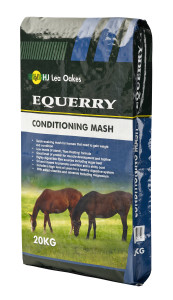Traditionally, mashes were made from wheat-bran and were fed irregularly, often just once a week. It was mistakenly believed that this helped to prevent digestive upsets. In fact, the laxative effect of bran mashes may be a result of mild digestive upset, caused by the abrupt change in diet. Similarly, the long-held belief that bran mashes helped to warm a horse is untrue; far more body heat will be generated by the fermentation of forage in the hind-gut. The problem with feeding bran alone is compounded by the fact that bran is very low in calcium and essential amino acids such as lysine.
Nowadays nutritionists rarely recommend feeding bran mashes – so what is the alternative? Thankfully, innovates, quick-soaking, nutritionally balanced mashes are available and are ideal when either hydration is an issue or when feeding succulent/wet feed is desirable e.g. when stabled on dry forage in winter.
We know that forage alone will not provide a fully balanced diet and this can contribute to problems such as reduced immune function and poor hoof quality. Modern mashes like Equerry Conditioning Mash, have been formulated to provide your horse with optimal levels of all the essential vitamins and minerals and, when fed daily, will help to keep your horse in tip-top health this winter.
In winter our horse’s diets tend to become much drier; preserved forages (i.e. hay/haylage) contain significantly less water compared to fresh grass. This combined with the fact that our horses can drink as much as 12% less water during chilly days can contribute to problems including reduced performance, increased risk of digestive upset and diminished appetite. A soaked mash will help to add water back into your horse’s diet and moreover they have been proven to help improve overall water intake, compared to feeding a dry concentrate feed. This becomes very important if your horse has to be confined to his stable, perhaps in atrocious weather.
Fussy feeders find conditioning mashes like Equerry Conditioning Mash simply irresistible! Rich in calories and essential amino acids they aid weight gain and help to promote top-line. The oil helps to encourage a shiny coat, whilst the highly digestible fibre and yeast help to maximize digestive efficiency. The Equerry mash is lower in starch than many mashes for horses that need to stay relaxed or minimise starch for other reasons.
Mashes are also a godsend for horses that have difficulty swallowing or chewing, including veterans with dental problems or horses prone to choke. They are ideal for disguising unpalatable medicine or powdered supplements.
Remember never to use water hotter than luke-warm or you will destroy all those helpful vitamins you have just paid for!




